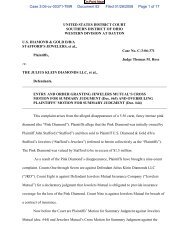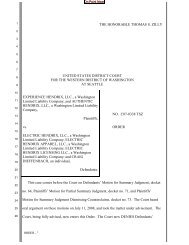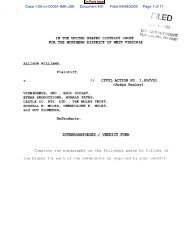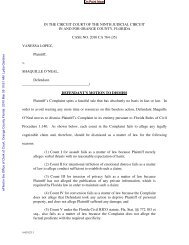GORDON KEENE VELLA. - On Point News
GORDON KEENE VELLA. - On Point News
GORDON KEENE VELLA. - On Point News
You also want an ePaper? Increase the reach of your titles
YUMPU automatically turns print PDFs into web optimized ePapers that Google loves.
So what a base rate is is what the general rate of the<br />
population is after we subtract the error rate to the extent to which<br />
we know that.<br />
So a very conservative estimate would be of all the people<br />
who are sexually abused as children, in my conclusion about 14 to<br />
16 percent of those will completely forget the abuse and then<br />
remember it years later. . . .<br />
Q. What is the error rate? . . .<br />
A. . . . So one way of looking at the error rate is what I call the direct<br />
method.<br />
And what we have is a number of studies, there are six<br />
studies that actually when people completely forget the abuse they<br />
had ways of estimating over time the estimate of people whose<br />
reports were likely to be false. And in one study it was 2.5<br />
percent. In another it was 5 percent. Another was 3.9 to 13.6<br />
percent. Another was 4 percent. Another was 1.9 percent.<br />
Another was 1.7 percent. If you average that out –<br />
. . . .<br />
(Id. at 43:1 - 45:20) (emphasis added.)<br />
The average error rate across these studies is about five<br />
percent, but that doesn’t mean in this given case it’s within that<br />
five percent. It just means that that’s the general rate for all the<br />
people who are abused who forget it.<br />
Thus, Dr. Brown employed figures from studies addressing the “accuracy” of recovered<br />
memories to provide an error rate for the hypothesis of dissociative amnesia or repressed<br />
memory. According to Dr. Pope, this testimony is materially misleading:<br />
These figures give the impression of great precision . . . because he<br />
implies that the only source of the error in such studies was the possibility<br />
of “people whose reports were likely to be false.” But in fact, the leading<br />
source of error in such studies is that the assumption of “complete<br />
forgetting” in such studies may itself be false, and indeed is very likely to<br />
be false . . . .<br />
(Pope Decl. 31.) Additionally:<br />
- 10 -
















